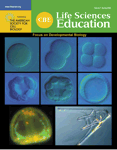Integrating PCR Theory and Bioinformatics into a Research-oriented Primer Design Exercise
Abstract
Polymerase chain reaction (PCR) is a conceptually difficult technique that embodies many fundamental biological processes. Traditionally, students have struggled to analyze PCR results due to an incomplete understanding of the biological concepts (theory) of DNA replication and strand complementarity. Here we describe the design of a novel research-oriented exercise that prepares students to design DNA primers for PCR. Our exercise design includes broad and specific learning goals and assessments of student performance and perceptions. We developed this interactive Primer Design Exercise using the principles of scientific teaching to enhance student understanding of the theory behind PCR and provide practice in designing PCR primers to amplify DNA. In the end, the students were more poised to troubleshoot problems that arose in real experiments using PCR. In addition, students had the opportunity to utilize several bioinformatics tools to gain an increased understanding of primer quality, directionality, and specificity. In the course of this study many misconceptions about DNA replication during PCR and the need for primer specificity were identified and addressed. Students were receptive to the new materials and the majority achieved the learning goals.



